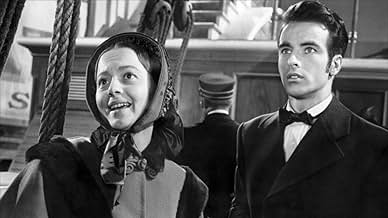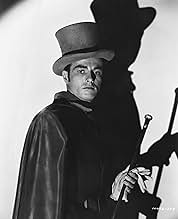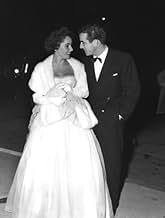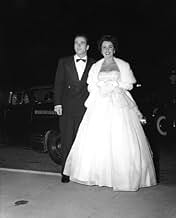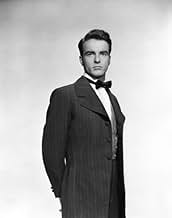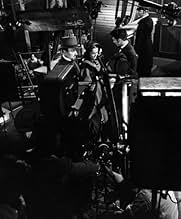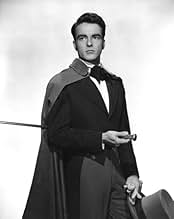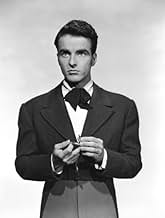AVALIAÇÃO DA IMDb
8,1/10
18 mil
SUA AVALIAÇÃO
Uma jovem ingênua se apaixona por um jovem bonito que seu pai, um abusador emocional, suspeita ser um caçador de fortunas.Uma jovem ingênua se apaixona por um jovem bonito que seu pai, um abusador emocional, suspeita ser um caçador de fortunas.Uma jovem ingênua se apaixona por um jovem bonito que seu pai, um abusador emocional, suspeita ser um caçador de fortunas.
- Direção
- Roteiristas
- Artistas
- Ganhou 4 Oscars
- 13 vitórias e 9 indicações no total
Mary Bayless
- Party Guest
- (não creditado)
Nan Boardman
- French Maid
- (não creditado)
Jack Chefe
- French Waiter
- (não creditado)
Marcel De la Brosse
- French Porter
- (não creditado)
Ray De Ravenne
- French Waiter
- (não creditado)
Avaliações em destaque
Henry James novel of spinster daughter of wealthy doctor being wooed by a fortune hunter is meticulously brought to the screen by Wyler and a stellar cast. The beautiful de Havilland, made to look plain and dull, is quite good in her Oscar-winning title role. Also fine are Clift as the gold digger and Hopkins as de Havilland's understanding aunt. However, the best performance is given by Richardson as the cold, domineering father who wants to protect his daughter but also despises her meek existence. Brown, who plays the maid, looks like a young Grace Kelly. The cinematography is excellent and there's a fine score by Copland.
Rewatching The Heiress after remembering nothing but great things about it, the film was every bit as brilliant as remembered and even better in fact. It is one of William Wyler's best, in a list that includes Ben-Hur, Roman Holiday and Dodsworth, and while there are some fine film adaptations of Henry James' work, like The Innocents and The Wings of a Dove my vote for the best goes to this, The Heiress.
Visually, it looks absolutely beautiful and is rich in atmosphere. The Gothic set design is atmospheric and strikingly handsome (never getting in the way of the characters or the story), the costumes are elegantly evocative, the shadowy lighting adds so much to the atmosphere without making it obvious and The Heiress really does have to be one of the most exquisitely shot films of the late 40s, not only being very easy on the eyes but also very expansive which allows us to really be part of the action and be really engrossed in how all the characters interact with one another. Aaron Copland's haunting Oscar-winning score is some of his best work, and Wyler directs immaculately, his work worthy of winning the Oscar rather than just being nominated.
The Heiress is also superbly scripted, with sharp, sometimes cruel but always compellingly realistic, dialogue, the subject matter explored intelligently, poignantly and sometimes chillingly. The story is chillingly intense and also absorbingly intimate, always powerful and never less than interesting, while the characters actually feel like real people (Morris is the least interesting one of the bunch, but only because of how compellingly written Catherine and Dr Sloper are. Wyler is also well-known for drawing out great performances and ensemble work, and not only do we get both here across the board but they're more than great. Olivia de Havilland won her second Oscar for this film, and it was richly deserved, it is a very meaty role with a character transformation from shy to cruel that could have rung false but de Havilland plays the shyness with poignant nuance and the cruelness to spine-chilling effect, by far my favourite performance from her.
Montgomery Clift has had more interesting characters in his career, but he plays the role with control and subtlety, even also with an unsettling ambiguity as well. Ralph Richardson, like de Havilland, also delivers his finest screen work in this film, the character's coldness played to perfection. Dr Sloper and Catherine's father/daughter relationship is somewhat the core of the film and is played with brilliant passion by both Richardson and de Havilland. Miriam Hopkins is amusing and charming, but in a way that doesn't jar at all, despite how it sounds in comparison to the story.
In conclusion, a brilliant film, one of Wyler's best films and the finest screen adaptation of Henry James with career-best work from de Havilland and Richardson. 10/10 Bethany Cox
Visually, it looks absolutely beautiful and is rich in atmosphere. The Gothic set design is atmospheric and strikingly handsome (never getting in the way of the characters or the story), the costumes are elegantly evocative, the shadowy lighting adds so much to the atmosphere without making it obvious and The Heiress really does have to be one of the most exquisitely shot films of the late 40s, not only being very easy on the eyes but also very expansive which allows us to really be part of the action and be really engrossed in how all the characters interact with one another. Aaron Copland's haunting Oscar-winning score is some of his best work, and Wyler directs immaculately, his work worthy of winning the Oscar rather than just being nominated.
The Heiress is also superbly scripted, with sharp, sometimes cruel but always compellingly realistic, dialogue, the subject matter explored intelligently, poignantly and sometimes chillingly. The story is chillingly intense and also absorbingly intimate, always powerful and never less than interesting, while the characters actually feel like real people (Morris is the least interesting one of the bunch, but only because of how compellingly written Catherine and Dr Sloper are. Wyler is also well-known for drawing out great performances and ensemble work, and not only do we get both here across the board but they're more than great. Olivia de Havilland won her second Oscar for this film, and it was richly deserved, it is a very meaty role with a character transformation from shy to cruel that could have rung false but de Havilland plays the shyness with poignant nuance and the cruelness to spine-chilling effect, by far my favourite performance from her.
Montgomery Clift has had more interesting characters in his career, but he plays the role with control and subtlety, even also with an unsettling ambiguity as well. Ralph Richardson, like de Havilland, also delivers his finest screen work in this film, the character's coldness played to perfection. Dr Sloper and Catherine's father/daughter relationship is somewhat the core of the film and is played with brilliant passion by both Richardson and de Havilland. Miriam Hopkins is amusing and charming, but in a way that doesn't jar at all, despite how it sounds in comparison to the story.
In conclusion, a brilliant film, one of Wyler's best films and the finest screen adaptation of Henry James with career-best work from de Havilland and Richardson. 10/10 Bethany Cox
10dglink
Certainly among the finest literary adaptations, "The Heiress" was based on Henry James's novel, "Washington Square" and features arguably Olivia de Havilland's finest screen performance. Morris Townsend , a handsome young man with ambiguous motives pursues Catherine Sloper, a plain spinster, who is slightly past marriageable age and possesses limited social skills. The young woman, who is the heiress of the title, is vulnerable prey for a penniless fortune hunter.
However, Montgomery Clift plays Townsend in an enigmatic manner, and viewers can debate his true intentions. Catherine's father, played by Ralph Richardson, and her Aunt Lavinia, played by Miriam Hopkins, take opposite sides in Townsend's pursuit of Catherine. Although both her father and her aunt appear to see through the handsome suitor, Aunt Lavinia is practical and sensitive to her niece's emotional needs, and she counsels compromise in pursuit of happiness, if only fleeting. However, Catherine's father is unyielding and essentially unloving in his opposition to the match. Throughout, Dr. Sloper compares his daughter's virtues to those of his late wife, and Catherine comes up lacking in every quality that he values. Sloper threatens to disinherit his daughter if she marries the suitor.
Montgomery Clift may appear shallow and transparent to some, but in essence those are the traits of his character. While Morris is slick and obviously fawning, he is not intelligent enough to be totally deceptive. Only someone as naive and needy as Olivia could fail to grasp that Morris may want something more than her love. Olivia de Havilland transcends her other performances and skillfully and convincingly evolves from a shy, introverted girl into a strong, vengeful woman. De Havilland has often portrayed women who appear genteel and soft on the outside, but whose hearts and backbones can harden into pure steel (e.g. Gone with the Wind; Hush, Hush, Sweet Charlotte), and Catherine Sloper is the finest of those roles. With able support from Richardson and Hopkins, Clift and de Havilland make the most of an outstanding screenplay, which was adapted from a stage play. William Wyler directs with a sure hand, and the atmospheric cinematography captures 19th century New York life. Period films are often unraveled by their hairstyles, which generally owe more to the year in which the film was made rather than that in which the story is set. However, even the coiffures excel in "The Heiress." De Havilland's hair looks authentic 19th century and underscores Wyler's fastidious attention to detail.
With an award-winning de Havilland performance, a handsome Montgomery Clift on the brink of stardom, and an engrossing Henry James story, "The Heiress" is one of the finest films of the 1940's. Without qualification, the film holds up to and merits repeat viewings if only to better argue the underlying motives of Clift and the fateful decision that de Havilland has to make.
However, Montgomery Clift plays Townsend in an enigmatic manner, and viewers can debate his true intentions. Catherine's father, played by Ralph Richardson, and her Aunt Lavinia, played by Miriam Hopkins, take opposite sides in Townsend's pursuit of Catherine. Although both her father and her aunt appear to see through the handsome suitor, Aunt Lavinia is practical and sensitive to her niece's emotional needs, and she counsels compromise in pursuit of happiness, if only fleeting. However, Catherine's father is unyielding and essentially unloving in his opposition to the match. Throughout, Dr. Sloper compares his daughter's virtues to those of his late wife, and Catherine comes up lacking in every quality that he values. Sloper threatens to disinherit his daughter if she marries the suitor.
Montgomery Clift may appear shallow and transparent to some, but in essence those are the traits of his character. While Morris is slick and obviously fawning, he is not intelligent enough to be totally deceptive. Only someone as naive and needy as Olivia could fail to grasp that Morris may want something more than her love. Olivia de Havilland transcends her other performances and skillfully and convincingly evolves from a shy, introverted girl into a strong, vengeful woman. De Havilland has often portrayed women who appear genteel and soft on the outside, but whose hearts and backbones can harden into pure steel (e.g. Gone with the Wind; Hush, Hush, Sweet Charlotte), and Catherine Sloper is the finest of those roles. With able support from Richardson and Hopkins, Clift and de Havilland make the most of an outstanding screenplay, which was adapted from a stage play. William Wyler directs with a sure hand, and the atmospheric cinematography captures 19th century New York life. Period films are often unraveled by their hairstyles, which generally owe more to the year in which the film was made rather than that in which the story is set. However, even the coiffures excel in "The Heiress." De Havilland's hair looks authentic 19th century and underscores Wyler's fastidious attention to detail.
With an award-winning de Havilland performance, a handsome Montgomery Clift on the brink of stardom, and an engrossing Henry James story, "The Heiress" is one of the finest films of the 1940's. Without qualification, the film holds up to and merits repeat viewings if only to better argue the underlying motives of Clift and the fateful decision that de Havilland has to make.
Catherine (Olivia de Havilland) is a thoroughly ordinary girl with one thing commend her—her money. That's the view of her father (Ralph Richardson), who believes he is cruel only to be kind. He takes a dim view of the handsome and charming man (Montgomery Clift) who courts her. Surely this idler's only possible motive for proposing marriage is to get her money. Catherine's aunt (Miriam Hopkins) may agree, but believes the two should marry anyway. Catherine is deeply in love, but her fiancé will forever change her view of herself, of her father and of human nature as a whole.
William Wyler directs Augustus and Ruth Goetz's adaptation of their own play, suggested by Henry James's "Washington Square," and it's a fine job by all. We rarely see such a subtle and precise view of people, presented in a way that allows us to draw our own conclusions about them. Is the father villainous and cruel? Is the fiancé a fortune hunter? Do we approve or disapprove of Catherine's decisions throughout the film? We're not told what to think.
De Havilland is fine at conveying the various shades of her many-faceted character. Richardson is excellent, making the most of his mellifluous voice and superb manners. Clift is good, though his diction is lazier than that of his co-stars'. I find Clift smug and unappealing, which doesn't detract from this particular character. Miriam Hopkins, a former leading lady, aged into character parts, gives a performance rich in detail and humor. Highly recommended.
William Wyler directs Augustus and Ruth Goetz's adaptation of their own play, suggested by Henry James's "Washington Square," and it's a fine job by all. We rarely see such a subtle and precise view of people, presented in a way that allows us to draw our own conclusions about them. Is the father villainous and cruel? Is the fiancé a fortune hunter? Do we approve or disapprove of Catherine's decisions throughout the film? We're not told what to think.
De Havilland is fine at conveying the various shades of her many-faceted character. Richardson is excellent, making the most of his mellifluous voice and superb manners. Clift is good, though his diction is lazier than that of his co-stars'. I find Clift smug and unappealing, which doesn't detract from this particular character. Miriam Hopkins, a former leading lady, aged into character parts, gives a performance rich in detail and humor. Highly recommended.
I saw this film about 10 years ago and have never forgotten it. Why it is not available on DVD - I just don't understand it.
Olivia de Havilland is heart-breaking as the woman who is so badly treated by her suitors and her father. I felt the portrayal of her father and the cruel way he treats her was so well played out and you could see how her soul is slowly being crushed.
I was so amazed and touched by the film, I went and got the book it is based on, Henry James' Washington Square. It was superb but nothing will make me forget the look on Olivia De Havilland's face at the end of the movie where you can see her features harden and all her youthful sweetness is gone.
Brilliant film!
Olivia de Havilland is heart-breaking as the woman who is so badly treated by her suitors and her father. I felt the portrayal of her father and the cruel way he treats her was so well played out and you could see how her soul is slowly being crushed.
I was so amazed and touched by the film, I went and got the book it is based on, Henry James' Washington Square. It was superb but nothing will make me forget the look on Olivia De Havilland's face at the end of the movie where you can see her features harden and all her youthful sweetness is gone.
Brilliant film!
Você sabia?
- CuriosidadesDirector William Wyler shot 37 takes of Olivia de Havilland carrying her suitcases up the stairs. Only after the final shoot, whereupon she briefly stopped on the second flight of stairs and leaned on the handrail for a couple of seconds, did Wyler declare that this was the take he wanted to print.
- Erros de gravaçãoThis story takes place at the end of the 1840s, but none of the men wear the cravats--material bound around the neck and tied in either the front or back--that were fashionable in that period; instead they wear neckties and bow ties, which did not come into fashion until the late 1850s.
- Citações
Aunt Penniman: Can you be so cruel?
Catherine Sloper: Yes, I can be very cruel. I have been taught by masters.
- ConexõesFeatured in AFI Life Achievement Award: A Tribute to William Wyler (1976)
Principais escolhas
Faça login para avaliar e ver a lista de recomendações personalizadas
Detalhes
- Data de lançamento
- País de origem
- Idiomas
- Também conhecido como
- La heredera
- Locações de filme
- Empresa de produção
- Consulte mais créditos da empresa na IMDbPro
Bilheteria
- Orçamento
- US$ 2.600.000 (estimativa)
- Faturamento bruto mundial
- US$ 158
- Tempo de duração
- 1 h 55 min(115 min)
- Cor
- Proporção
- 1.37 : 1
Contribua para esta página
Sugerir uma alteração ou adicionar conteúdo ausente


